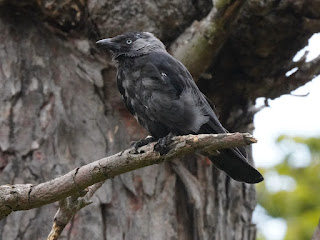The Robins have recovered from their late summer lull and are back in full song. You can hear one singing every few yards along the Flower Walk.
On the other side of the path another was looking for worms in a flower bed.
The young Robin at the southwest corner of the bridge is looking tatty as it changes into adult plumage.
The widowed male Peregrine returned to the barracks tower. He has a large territory with masses of Feral Pigeons for the taking, and I'm sure a young female will be delighted to join him.
The female Little Owl at the Round Pond was in her usual horse chestnut tree, but in a place where you couldn't get an unobstructed view.
A Jackdaw perched on the dead tree where the owls nest.
A flock of Black-Headed Gulls moved along the shore looking for insects and worms till they were scared into the air by a small child running amok.
The three Grey Heron chicks on the island were all in view.
The teenager from the second nest was at the other end of the island in the dead tree where the Cormorants perch. It had the tree to itself, as there still aren't many Cormorants.
A Great Crested Grebe and one of the three chicks avoided an oncoming pedalo.
The family on the Long Water were mixed up with the large crowd of Common Pochards, of which 87 were counted a few days ago.
A pair of Gadwalls cruised by. There are seldom many of these here and the most I have ever seen is 22.
The Black Swan has been on the Round Pond for the past few days, probably after a fight with one of the dominant Mute Swans on the Serpentine. But he finds the pond boring and no doubt will fly back to the lake soon.
Andrea the gardener in the Dell tells me that the two young foxes have been eating the Moorhens. There is just one at the moment. It was preening on a rock in the stream.
There are still some Migrant Hawker dragonflies, and I saw one in the Italian Garden and this one resting in the shade beside the Long Water.
A Willow Emerald damselfly perched on a reed at the southwest corner of the bridge ...
... where the long suffering box tree is again under attack by Box Tree Moth caterpillars. This one was climbing up its thread and had reeled in a bundle of slack.















Beside the Box Tree Moth there is another pest that is spreading in Southern England, (and whose first record in the UK was actually in Hyde Park a few years ago): Choreutis nemorana, the Fig-leaf Skeletoniser moth. You can find it easily on the leaves of the fig trees near the east end of the Flower Walk, as well as its many caterpillars under their silk coverings in the rolled up leaves
ReplyDeleteThanks, I'll go and look. Sorry about your comment appearing twice: Blogger occasionally does that and I simply clean it up when I see it.
DeleteDoesn't the Peregrine strike you as looking bereaved? You called him the widower in Monday's entry and he does indeed look like someone in mourning.
ReplyDeleteTinúviel
It was drizzling slightly, which may have been part of the cause. But I'm not sure I've ever seen a Peregrine looking happy.
Delete